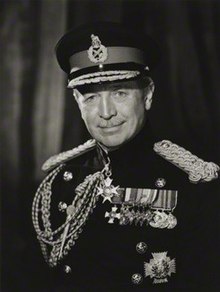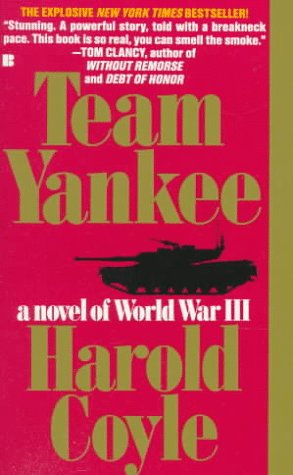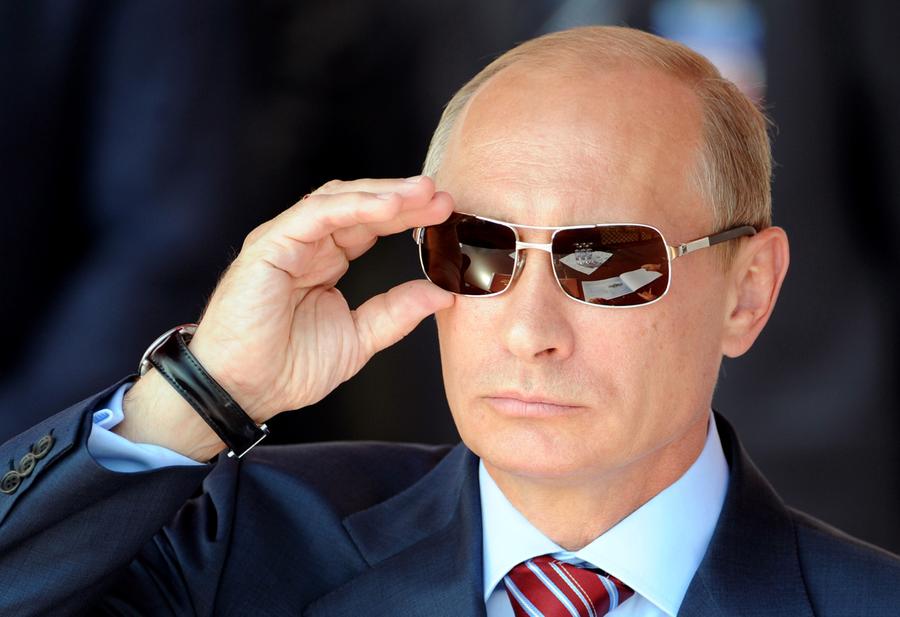Modern wargamers frequently explore what-if scenarios involving conflict between Russia and NATO. Two fictional books explore this territory, with the fascinating commonality of being future histories written by British Army generals.
The Third World War
General Sir John Hackett & others (pub. 1978)
1985: The bear cornered. Facing difficulties at home, a troubled communist state tries to confound the new American president with a series of coordinated global crises. After initial successes, the USSR overplays its hand in Yugoslavia, and is drawn into direct conflict with the US. Claiming defence against NATO aggression, the USSR surges into Central Europe.
The Third World War is written as a 1987 post-war history, after the dust has settled. There is a somewhat dry description of the state of the world in 1984, leavened with colourful depictions of forces in conflict in various theatres. Hackett collaborated with experts in other military and economic domains. There are strategic maps showing the grand manoeuvres of both sides. There are photos captioned to represent the fighting in Europe and around the world. There are some chilling descriptions of the success (or otherwise) of home defence efforts in withstanding a nuclear strike.
The Third World War is the benchmark classic of 1980s Cold War Gone Hot alternative history. It depicts a detailed worldview, and also some vignettes of action within that bigger picture. There was a 1983 sequel (The Third World War: The Untold Story) which has more vignettes, and I would love to get my hands on a copy.
Hackett’s Third World War has influenced other writers. Harold Coyle used Hackett’s scenario explicitly as the background for his famous Team Yankee novel. Wikipedia says Max Brooks used the ‘post-event history’ format as inspiration for his own excellent World War Z.
Hackett did not forsee the changes to the British military in the early 1980s as a result of Thatcher and the Falklands, but otherwise his book stands up as plausible what-if.
Hackett served in WW2 in the Middle East, North Africa, and was seriously wounded at Arnhem. He was later promoted to General, commanded NORTHAG, and was (in)famous for writing a 1968 letter to The Times critical of the British Government’s lack of commitment to NATO. He signed it as a NATO officer, rather than as a British Army officer (once you are posted to NATO, where should your loyalties lie?).
 |
| General Sir John Hackett |
2017: War with Russia
General Sir Richard Shirreff (pub. 2016)
2017: The bear resurgent. Having recently moved into the Crimea and eastern Ukraine, an emboldened Russia invades the Baltic states, which are NATO members. Putin threatens any NATO reaction with nuclear retaliation. European politicians, having reduced their conventional militaries and NATO commitments in the post Cold War years, are left grappling with this fait accompli.
This work is written in a somewhat Clancy-esque novel style, as opposed to Hackett’s history book. Shirreff describes his work as "fact-based prediction rather than fiction". Much of the action concentrates on Latvia. Shirreff has an everyman, Captain Morland of the Mercians, who is involved in a number of key small unit actions to stymie Putin’s fiendish plans. Back in Brussels, the Deputy Supreme Commander of NATO, General McKinlay, is clearly an analogue of the author, who held the same role at NATO headquarters. Like the real-life Hackett (and presumably Shirreff), he grapples with split loyalty to NATO and the UK.
| Armata T-14 Prototype |
There are no large scale actions in this what-if, unlike Hackett’s vision. Some ultra-modern Russian equipment is name-checked, such as the Sukhoi PAK-FA, Armata T-14, Su-34, and BMD-4. There is a lot of skirmishing between politicians and senior military officers, as Shirreff indirectly lectures us on what needs to be done to prevent his scenario becoming reality. There is frequent truly awkward expositionary dialogue:
“Damn’, said [Putin]. ‘Never mind. It is enough. We are telling the world the Americans opened fire on our pilots first and, thankfully, the wreckage of the Sukhoi fell behind our lines. That proves it was shot down over our airspace. Our friends are saying that this is not only naked aggression by America, it is also NATO attacking Russia. Russia is justified in defending herself. The only response is war. Get me Merkulov on the phone. Now.”
Shirreff did not forsee Brexit or Trump, and how this will affect NATO and the West’s relationship with Russia remains to be seen.
General Sir Richard Shirreff was Deputy Supreme Commander of NATO before his retirement in 2014. He deplores the military drawdown in Europe, noting along with his contemporaries that Russia is the only existential threat to the US and UK.
 |
| General Sir Richard Shirreff |
Conclusion
It is a peculiarly British characteristic for a retired senior officer to publish fiction in order to convey a request for increased defence expenditure.
Hackett wrote in 1978 to demonstrate that with sufficient will, by 1985 NATO could be reinvigorated and be able to withstand Warsaw Pact aggression lest the USSR “enjoy the fruits of a military victory without having to fight for it.”
Shirreff gives a shorter timeline, writing in 2016 to warn against possible Russian aggression in 2017. He identifies Russia as the west’s strategic adversary. He describes his book as a wake-up call, whereby Putin’s annexation of Crimea and actions in Ukraine have “started a dynamic that can only be halted if the West wakes up to the real possibility of war and takes urgent action.”
Hackett's situation never occurred, but he writes a compelling what-if. Shirreff's less ambitious scenario is more plausible and just as concerning, but unfortunately less well written. He does give an insight into the difficulties facing NATO member cooperation, and the issues facing a NATO commander.
One can only hope that, like Hackett's work, Shirreff’s becomes a future source of war gaming what-ifs, rather than a prophetic vision.
All photos via Google Images






I have both of Hackett's books on my "To Read (Someday)" shelf. I think I started the first one the last time I was excited about Cold War Goes Hot gaming but, as you say, found it a bit dry and didn't get through it before interests shifted.
ReplyDeleteI read Clancy's Red Storm Rising many years ago, and thought it was pretty good.
I haven't read Team Yankee, but I did read Sword Point by Harold Coyle which is another US/NATO vs. Soviets what if - that takes place in Iran, of all places. I think i did run a Force on Force or (Savage World: Modern Ops?) scenario that might have been based on a part of the book - Spetznaz and SAS teams both show up at a remote Iranian village where they have both been informed a nuclear device is being assembled...?
Another good book is First Clash by Kenneth Macksey. Not so much a warning of things to come but a step-by-step account of the 4th Canadian Mechanized Brigade Group at all levels of command from the first warning order to taking up positions in the line to the first clash with soviet forces and a bit of the outcome. I think it was originally written for the Canadian Forces as an instructional manual for how an operation involving a mechanized brigade group should all go down if things went hot in Europe.
I may have to have a look for 2017 War with Russia!
'Team Yankee' is worth a read, I'll keep my eyes out for 'First Clash'. I've got 'Sword Point' somewhere, I'll have to dig it up.
DeleteAbsolutely could not stand 2017 war with russia. Alot of bias in that book and he portrays the adversaries as some sort of bond villian.
ReplyDeleteI recommend Harvey Blacks new Cold War Redux. A far superior read.
So much potential for a good read... I agree it was a slog.
DeleteI've heard good things about Harvey Blacks other books, I will check him out.
I have read pretty much all the books, but 2017. I might pick it up.
ReplyDeleteLet us know what you think of it!
DeleteI will, just got to get it first.
DeleteHi all
ReplyDeleteRalph Peters 'Red Army' is worth seeking out - its sort of Team Yankee from a soviet viewpoint
Bob Forrest-Webb wrote 'Chieftains' which is (again) Team Yankee from the British point of view...
Well worth looking for!
Ed
Thanks, Ed, I've heard good things about these before and will keep my eyes out for them!
DeleteThe Rand Corporation wargamed the scenario that Shirref describes in 2014 with the US military. They drew similar conclusions. See https://www.rand.org/content/dam/rand/pubs/research_reports/RR1200/RR1253/RAND_RR1253.pdf
ReplyDeleteFascinating, thanks!
Delete